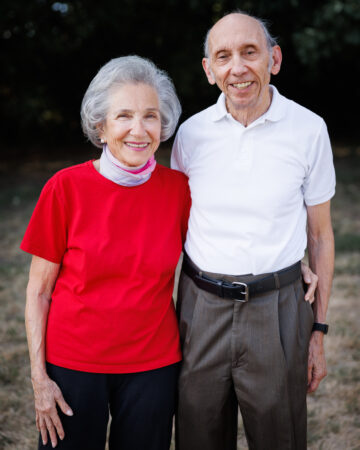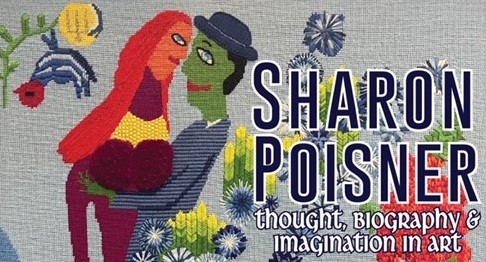The Epsten Gallery at Village Shalom is hosting “Sharon Poisner: Thought, Biography & Imagination in Art,” an exhibit featuring the works of Poisner throughout her artistic journey.
The exhibit opened on Nov. 14 and will be displayed at The Epsten Gallery (5500 W. 123rd St., Overland Park, KS 66209) until Jan. 2. It is supported by the Polsky Family Supporting Foundation.
“Art, for me, is a personal and biographical pursuit,” Poisner said. “It’s an ongoing hobby that brings me joy, even if I sometimes take significant breaks from it. I tend to start without a fully formed vision, letting the work evolve as I go along. The themes often reflect my Jewish values and family life, but they also express a side of me that isn’t always immediately visible. The process of creating art allows me to explore spontaneity, creativity, and a playful side that’s not always apparent in my day-to-day life.”
Poisner’s story, reflected in her art, is deeply entwined with the community. Born Sharon Agron on Dec. 8, 1937, to Gus and Ann Agron, she was introduced to music at a young age when her father insisted she would play the accordion. At age seven, he invested a significant portion of his income to buy her one of the rare “midget” accordions in the U.S. Though she never understood her father’s fascination with the instrument, music remained an important part of her life.
Judaism was a central part of Poisner’s identity, moreso than her gender. A competitive, goal-oriented tomboy, she was driven to excel. In eighth grade, she set her sights on attending out-of-state universities and, after negotiating with her parents, completed both high school and college in just three years, earning her B.A. at 19.
At 19, she met Bill Lowenstein, a 31-year-old who quickly became the love of her life. They married that summer, and she soon had four sons. As her children entered school, she returned to her studies, earning an M.A. in Middle Eastern history from UMKC and a Ph.D. in American history from KU. Her academic journey was interrupted by a near-fatal car accident that left her paralyzed for several months. This traumatic event, however, became a turning point, leading to seven years of psychoanalysis that helped her overcome repressed memories and reshaped her life.
After 32 years of marriage, Sharon and Bill Lowenstein divorced amicably. They remained on good terms, sharing updates about their sons and families, and continued to work out together at the Jewish Community Center. Years later, after completing law school and building a successful family law practice, her life took another unexpected turn. Rabbi Gil Shoham, a widowed Orthodox rabbi, was introduced to her through a mutual friend. They married in 2012, with Sharon believing their time together would be brief due to his health issues. But ten years later, she lost Rabbi Shoham, an event that profoundly impacted her.
In 2014, she moved from her dream lake home to a villa at Village Shalom, a decision that would again lead her to a new chapter in life. A friend invited her to a Great Books Discussion Group at Village Shalom, where she met KU Professor Emeritus Alan Poisner, who had also recently lost his wife of 50 years. They quickly connected and became engaged in May 2014. By October, she became Sharon Lowenstein Poisner, and her villa became their shared home.
“Now in my mid-80s, I continue to be a lifelong learner,” she said. My passion for learning remains as strong as ever, particularly when it comes to visual art. I’ve always enjoyed analyzing art-whether it’s interpreting the meaning behind a piece or simply appreciating the details. In the 1970s and ‘80s, I created three needlepoints on pre-painted canvases, one of which modified by transforming a Catholic cardinal into a rabbi reading Torah. However, it wasn’t until decades later, at a JCC Heritage art show, that I took my first formal art class.”
Poisner credits The J art instructors Patricia Caviar and Gloria Gale for encouraging her independence in exploring art. To this day, she considers herself “an artist in progress.”
“Ultimately, I’ve learned to appreciate the value of the journey, not just the destination. In art, as in life, the act of creation itself brings pleasure-without the need for deep thinking, approval, or judgment. It has also taught me to look more carefully, to notice the details around me and to keep growing through the act of creation.”
More information about the exhibit and The Epsten Gallery is available by calling (816) 645-4145.

Sharon Poisner and her husband, Dr. Alan Poisner.



